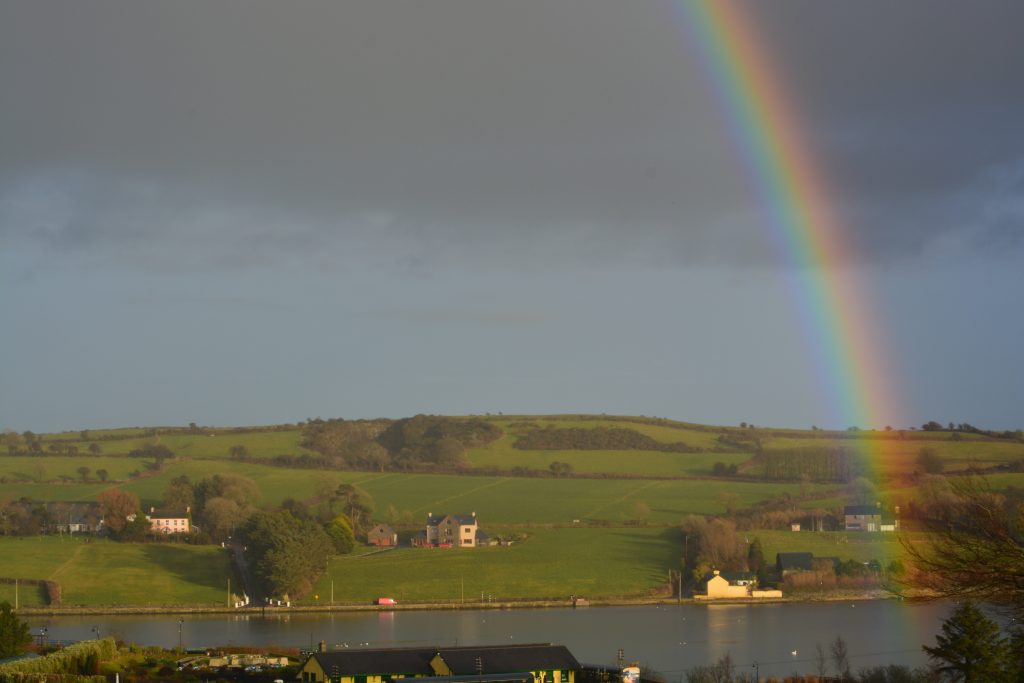How to survive in a world gone mad.

We’re great here in Ireland for asking “how are you?” It’s really a figure of speech for “hello” as the response expected is rarely more than “grand” or “fine”.
While we agree in conversation that there are terrible things going on in the world, our ability to really engage with them is limited. Our survival drive moves us quickly along to the next thing in our lives, staying close to all the things that are familiar and safe to us.
But in deeper reflection, how am I feeling? Right now, I’m feeling shocked, disgusted, angry. Sometimes, I feel fear for the future. I feel suspicious and distrustful. And then, I feel helpless, despairing, saddened. What is the future for a world that seems to have gone mad?
This maelstrom of emotions causes turmoil and turbulence. They are all valid, and all can co-exist alongside each other – they don’t cancel each other out. The outcome of this emotional upheaval is stress. Stress occurs when “our perceived challenges are greater than our perceived resources” (Kelly McGonigal). Absorbing the news reports on these worldwide events, the impact on victims and their families, the loss of life, the utter non-sense of it all – I feel very inadequate. I simply do not have resources to solve these problems.
Stress is a necessary primal drive that calls us to action. Without it we wouldn’t get going. Emotions fuel this stress, so what if we look at these emotions as resources in themselves? What if emotions can help to resource us to take on our perceived challenges? To step forward and make whatever difference we can. Small actions can have large repercussions.
How can we make an impact on this world of ours, the one that our children and grandchildren will inherit? How can we influence the next generations to live meaningful and rich lives, that are above “fake news” and childish leadership.
Rather than being “grand” many people are isolated, lonely and vulnerable. Recent statistics show 1 in 3 Irish people confess to feeling isolated. Many more are poverty stricken and struggling. Some are depressed and hopeless.
The one thing that connects humans is our emotions, how we feel about given things in our lives. Human connection can change everything. Think of a time that someone made a kind gesture in a difficult time, or listened to you when you felt alone. The power of emotions, is in using them to connect, support, comfort and inspire each other. Deliberately using how we feel in a more positive way can only deliver positive results.
So, use your EQ to start the ripples – here are 5 things you can do.
- Make a connection – call your parents, meet someone you haven’t met in a while, check in with an elderly neighbour, reach out to someone you’ve been meaning to, but haven’t yet. Make an effort to connect with someone that you might usually avoid.
- Listen – no, really listen. Don’t speak, don’t think up your response, advice, argument, retort – just listen. And then – ask questions that help you understand more. And then – listen some more. Few of us listen to each other properly – we hear sometimes, half-hear a lot of the time (Mom, I already told you that!) but we don’t listen to what’s not being said. And therein lies a lot of heartache and angst. We can help by listening.
- Share – rather than answer “fine” give a more honest answer. It doesn’t have to be chapter and verse, but “I’m struggling a bit today” or “I’m having a good day today” invites your counterpart to engage with you. Sharing how we are, can lead to comparing of similar experiences and gives us potential insights to situations already encountered by others. We learn from each other, and sharing our lessons can help others with their challenges.
- Ask – How can I help you? And mean it! Is there anything I can do? All open and honest questions which give you a platform from which you can help someone else. Try to remember to ask those you meet during the day. After a while, the ripples start and your friends start to ask the same of you. Soon, you have a network of people ready and willing to support each other. How powerful is that?
- Feel – don’t be afraid of the big feelings that arise. It takes big feelings to make a change, big feelings to drive on, big feelings to really care. And to care is to be human. The hope would be that the more we engage with positive intent, the less we have to listen to horrific news stories that stem from hate, misunderstanding, fear and lack of trust. .
Use the power of your emotions to build and maintain great relationships and rich friendships. Use it to influence change in a positive way. Use it to make a difference where you can, no matter how small it may be. Studies show that Emotional Intelligence has a ripple effect which grows exponentially.
I wonder what kind of world our grand-children would have if there was just a bit more emotional intelligence brought to bear. What would that feel like?
We have to start somewhere, so as Gandhi said
“Be the change you want to see in the world”.
